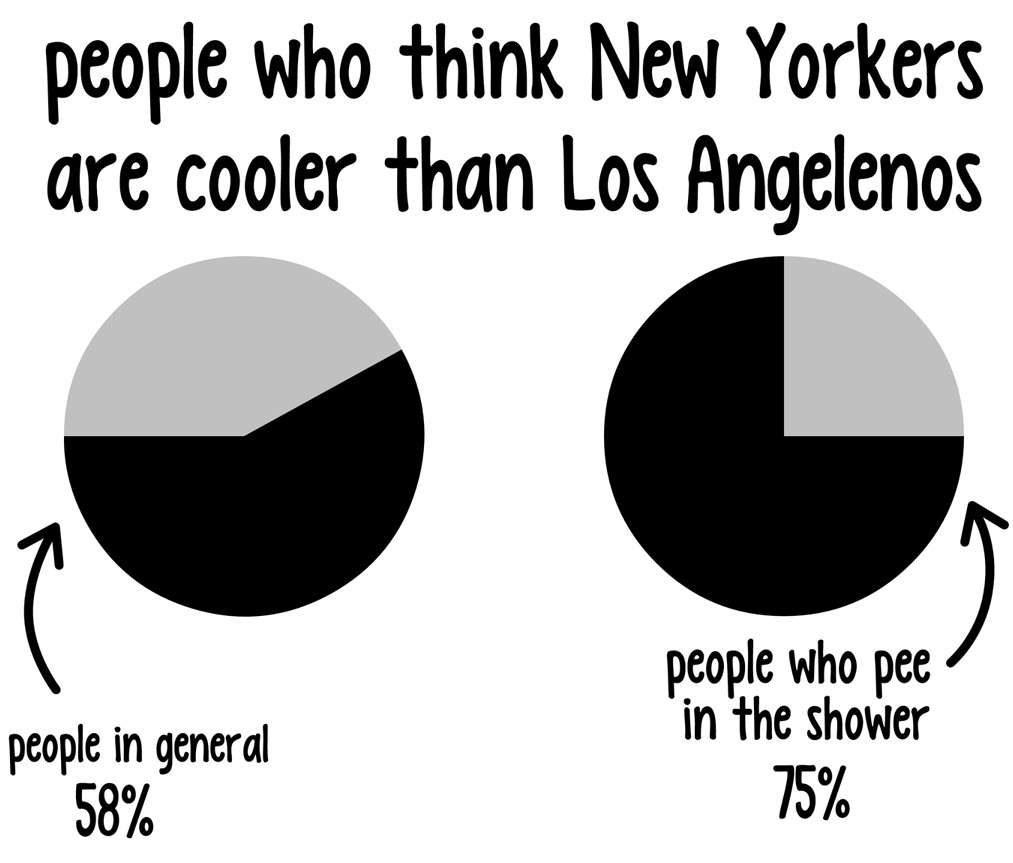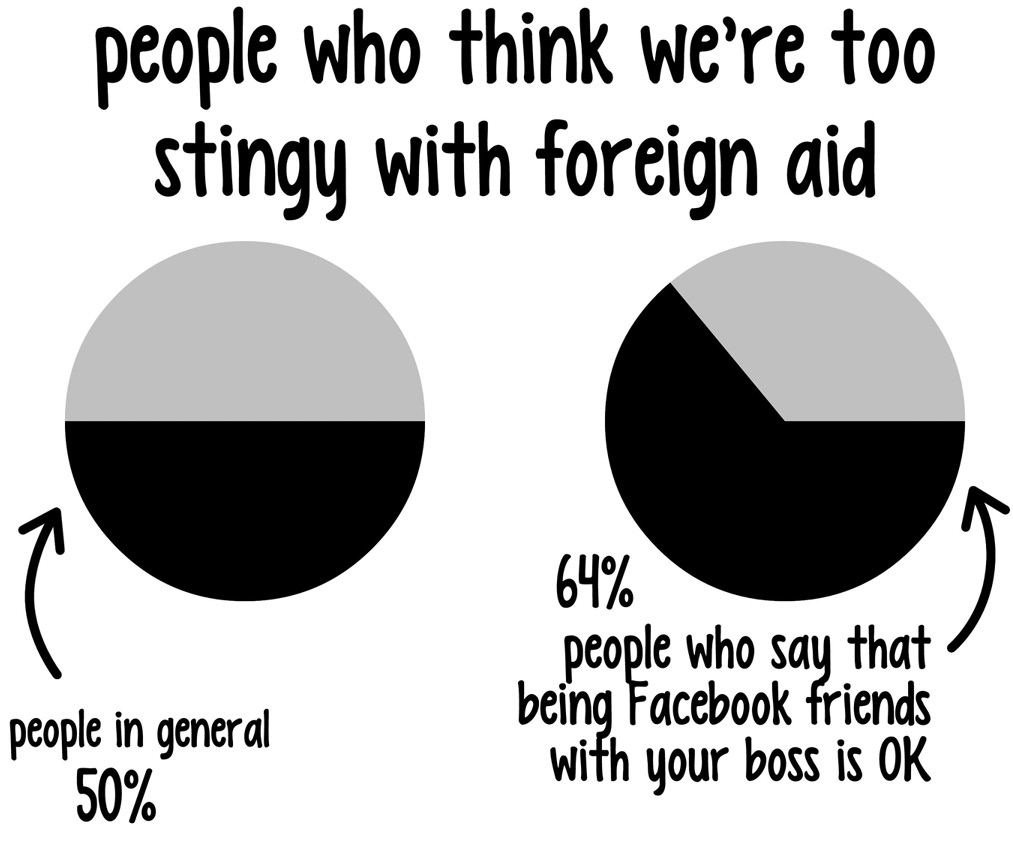Correlated (2 page)
Authors: Shaun Gallagher

25%
of people say they are better at punctuality than punctuation.
But among those who wouldn't describe themselves as absent-minded,
38%
say they are better at punctuality than punctuation.
----------------
32%
of people say they had a negative first impression of Pope Francis.
But among those who wouldn't describe themselves as absent-minded,
44%
had a negative first impression of Pope Francis.
----------------
42%
of people regularly eat yogurt.
But among those who wouldn't describe themselves as absent-minded,
52%
regularly eat yogurt.
You're extremely likely to say you aren't absent-minded if you both:
- aren't a coward
- think clowns are fun
People who wouldn't describe themselves as absent-minded are almost exactly as likely as the average person to:
- say the city where they live is more important than the job they do
- keep it a secret if they found out they had only six months to live
- have participated in an eating contest

38%
of people ascend the stairs two at a time.
But among those who don't think Adam and Eve had belly buttons,
50%
ascend the stairs two at a time.
----------------
36%
of people dislike sideburns.
But among those who don't think Adam and Eve had belly buttons,
48%
dislike sideburns.
----------------
49%
of people prefer
Steven
over
Stephen
.
But among those who don't think Adam and Eve had belly buttons,
60%
prefer
Steven
over
Stephen
.
You're extremely likely to think that Adam and Eve didn't have belly buttons if you both:
- find Australians sexy
- are not a fan of Coldplay
People who don't think Adam and Eve had belly buttons are almost exactly as likely as the average person to:
- refuse to tip a server when they receive poor service
- prefer to be the X in tic-tac-toe
- own flat-screen TVs
66%
of people like cotton candy.
But among those who use air freshener in their home,
79%
like cotton candy.
----------------
45%
of people say they are closer to lower class than upper class.
But among those who use air freshener in their home,
58%
say they are closer to lower class than upper class.
----------------
42%
of people have bouts of indigestion more often than bouts of indignation.
But among those who use air freshener in their home,
52%
have bouts of indigestion more often than bouts of indignation.
You're extremely likely to use air freshener in your home if you both:
- prefer debit cards over credit cards
- regularly wear cologne/perfume
People who use air freshener in their home are almost exactly as likely as the average person to:
- fear public speaking
- apply antiperspirant at night
- put a cap on uppercase
J
s
34%
of people tend to micromanage when they're in a leadership role.
But among those who prefer an aisle seat on a plane, only
20%
tend to micromanage when they're in a leadership role.
----------------
41%
of people aren't bothered by parents who kiss their adult children on the lips.
But among those who prefer an aisle seat on a plane,
54%
aren't bothered by parents who kiss their adult children on the lips.
----------------
39%
of people believe the chicken came before the egg.
But among those who prefer an aisle seat on a plane,
52%
believe the chicken came before the egg.
You're extremely likely to prefer an aisle seat on a plane if you both:
- say your primary alarm clock is not your phone
- are good at parallel parking
People who prefer an aisle seat on a plane are almost exactly as likely as the average person to:
- prefer to dry their hands with paper towels in public restrooms
- say they can perform a handstand
- cut the fabric tags off of clothing
MARGIN OF ERROR
Suppose you live in a bustling city with half a million residents, and you want to know what percentage of those residents prefer Beethoven to Mozart.
It would be impractical to ask all 500,000 of them, so instead, you decide to ask a representative sample.
As you might imagine, the larger your sample size, the more likely their responses will reflect the preferences of the entire population.
A poll's margin of error tells you the range of expected variation between your poll results and the value you would get if you polled the entire population. Margin of error decreases as your sample size grows.
Here's an example: Suppose you poll 1,000 residents and find that 48% prefer Beethoven and 52% prefer Mozart.
With about 95% confidence (see page 19), your margin of error is plus or minus 3 percentage points, meaning it's highly likely that if you were to repeat your survey with another sample group, the percentage of people who say they prefer Beethoven would be between 45% and 51%, and the percentage of people who say they prefer Mozart would be between 49% and 55%.
It's plausible, however, that if you were to poll the entire city, you might find the percentage of people who prefer Beethoven is actually at the top of the expected range, 51%, and the percentage who prefer Mozart might be at the bottom of the expected range, 49%.
Because of this possibility, when the range of values that fall within a poll's margin of error overlap, the results of the poll are often described as a statistical tie, meaning that we cannot be sufficiently confident that one option is preferred over the other.
60%
of people have never been in a fistfight.
But among those who don't believe aliens exist,
72%
have never been in a fistfight.
----------------
49%
of people swear a lot.
But among those who don't believe aliens exist, only
37%
swear a lot.
----------------
32%
of people have had to make a life-or-death decision.
But among those who don't believe aliens exist, only
21%
have had to make a life-or-death decision.
You're extremely likely to think aliens don't exist if you both:
- oppose gay marriage
- think prostitution should be illegal
People who don't believe aliens exist are almost exactly as likely as the average person to:
- have never cried over the death of someone they've never met
- prefer little dogs
- not own any leather clothing, aside from footwear or belts
45%
of people use the phrase
a couple
to mean “a few,” rather than exactly two of something.
But among those who have never pulled an all-nighter,
67%
use the phrase
a couple
to mean “a few,” rather than exactly two of something.
----------------
64%
of people think that fooling kids into thinking that Santa is real is a harmless fib.
But among those who have never pulled an all-nighter,
82%
think that fooling kids into thinking that Santa is real is a harmless fib.
----------------
20%
of people prefer their application dock/dashboard to run along the side of their screen.
But among those who have never pulled an all-nighter,
37%
prefer their application dock/dashboard to run along the side of their screen.
You're extremely likely to have never pulled an all-nighter if you both:
- tilt your head to the left when you go in for a kiss
- don't have a long commute
People who have never pulled an all-nighter are almost exactly as likely as the average person to:
- be dog lovers
- regularly clip coupons
- be more likely to splurge on where they stay than where they eat while on vacation
53%
of people prefer lemonade to iced tea.
But among those who don't like bananas,
71%
prefer lemonade to iced tea.
----------------
74%
of people like pumpkin pie.
But among those who don't like bananas, only
57%
like pumpkin pie.
----------------
24%
of people say they have curly hair.
But among those who don't like bananas,
39%
have curly hair.
You're extremely likely to dislike bananas if you both:
- think of soup as only a cold-weather food
- don't like guacamole
People who don't like bananas are almost exactly as likely as the average person to:
- think a moat is a more important feature in a castle than secret passages
- prefer a neat-freak roommate over a messy one
- be good at remembering the words to songs
38%
of people regularly use an RSS reader.
But among those who don't have a best friend,
51%
regularly use an RSS reader.
----------------
51%
of people say their favorite kind of melon is not watermelon.
But among those who don't have a best friend,
63%
say their favorite kind of melon is not watermelon.
----------------
74%
of people prefer Alex P. Keaton of
Family Ties
to Mike Seaver of
Growing Pains
.
But among those who don't have a best friend,
85%
prefer Alex P. Keaton of
Family Ties
to Mike Seaver of
Growing Pains
.
You're extremely likely to not have a best friend if you both:
- aren't interested in sign language
- trust professional critics' movie recommendations more than those of your friends
People who don't have a best friend are almost exactly as likely as the average person to:
- say their political opinions are substantially different from those of their parents
- rather see increased funding to the arts than to the sciences
- like white pizza
23%
of people think climate change is not caused by humans.
But among those who dislike Big Government more than Big Business,
49%
think climate change is not caused by humans.
----------------
49%
of people think a woman should take her husband's last name.
But among those who dislike Big Government more than Big Business,
68%
think a woman should take her husband's last name.
----------------
54%
of people have a neutral or positive opinion about homeschooling.
But among those who dislike Big Government more than Big Business,
66%
have a neutral or positive opinion about homeschooling.
You're extremely likely to dislike Big Government more than Big Business if you both:
- oppose embryonic stem cell research
- are confused by modern art
People who dislike Big Government more than Big Business are almost exactly as likely as the average person to:
- like marshmallows in their hot chocolate
- take pleasure in putting things in order
- say they'd rather ride a roller coaster than a waterslide

